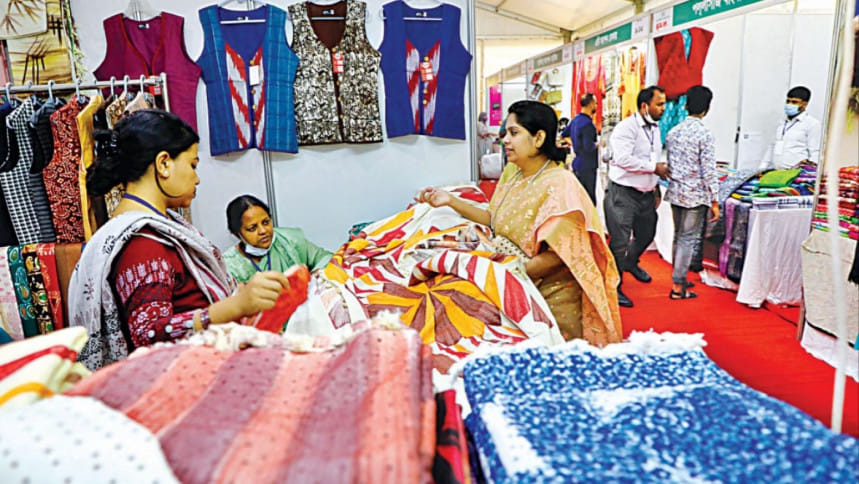Small businesses navigated difficult times in 2023

Small businesses in Bangladesh faced substantial hardships in 2023 as their sales took a steep dive last year due to ongoing inflationary pressure in the country, according to various businesspeople.
Besides, their profits shrivelled for a subsequent hike in production costs, particularly those associated with sourcing raw materials and transporting goods.
As such, many small-and-medium enterprises (SMEs) are being compelled to wind down their operations amid the current economic climate, according to various businesspeople.
Arifa Yasmin Mayuri, an award-winning entrepreneur with a highly successful handicrafts business in the district headquarters of Jamalpur, said her sales dropped by about 50 percent.
"Most handicraft makers are enduring financial struggles due to lower sales as customers have become reluctant to spend on non-essentials amid the unprecedented inflation," she added.
Mayuri, who received the National SME Women Entrepreneurs Award in 2019 and Joyeeta Award in 2016, also said her losses have been intensified by a roughly 50 percent rise in production costs.
For example, making simple apparel items, such as a dress, used to cost about Tk 400 per piece but it now takes as much as Tk 600 due to the hike in raw material prices.
Meanwhile, the cost of other inputs saw a similar hike with workers' wages having increased to about Tk 200 per dress while it was Tk 130 previously, she added.
Maksuda Khatun, the proprietor of an export-oriented leather goods company called Shabab Leather, said business last year was even worse than what it was during the Covid-19 pandemic.
"We passed every moment of 2023 amid uncertainty due to higher raw material prices and hurdles in opening letters of credit [LCs] amid the ongoing US dollar crisis," she added.
Khatun informed that she was compelled to cancel work orders amounting to about $60,000 last year for failing to open LCs against her exports.
"This was a big setback for a small business like ours," she said.
Another challenge is that production costs are rising within the time it takes to get a work order after providing the price quotation, thereby narrowing the profit margin even to the point of incurring losses.
"This leaves us with the difficult choice of having to cancel work orders," Khatun added.
She also pointed out that the price of common leather has surged by about Tk 40 per square foot to between Tk 120 and Tk 160 over the past year.
With this backdrop, Khatun said the inflated price of raw materials is making it near impossible for local exporters to survive in the global market in face of competition from countries like India and Pakistan.
Manirul Islam Munna, who sells mattresses and other bedding items from his store in Dhaka's Panthapath, reported 70 percent lower sales in the past five months.
Still, he anticipates better days ahead if the ongoing economic and political uncertainly are resolved after the upcoming national election.
Saidur Rahman, owner of Saidur Furniture in the same area, had to close three of his five outlets after incurring substantial losses resulting from a roughly 60 percent drop in sales last year.
In fact, the situation has become so difficult that some stores, such as DC Foreign Furniture and Kakan Furniture in Panthapath, have had to close down their operations, according to local traders.
As per data of the Bangladesh Bureau of Statistics (BBS), SMEs account for some 25 percent of the country's gross domestic product.
Sumanta Kumar Mohanta, a senior official of the Bangladesh Women Chamber of Commerce and Industry, emphasised on the need for special government assistance.
This includes providing stimulus packages and improved banking facilities to help SMEs survive the current crisis, he said.
Mohanta added that the government should provide training to enhance the manufacturing and export marketing skills of SMEs while also easing the overall export process, including logistics and customs.
M Abu Yusuf, executive director of Research and Policy Integration for Development, said the SME sector faced setbacks due to Covid-19, the Russia-Ukraine war and escalating raw material prices.
With this backdrop, he urged the government to subsidise utility services in the country so that SMEs can stay afloat amid the current economic climate.

 For all latest news, follow The Daily Star's Google News channel.
For all latest news, follow The Daily Star's Google News channel. 








Comments